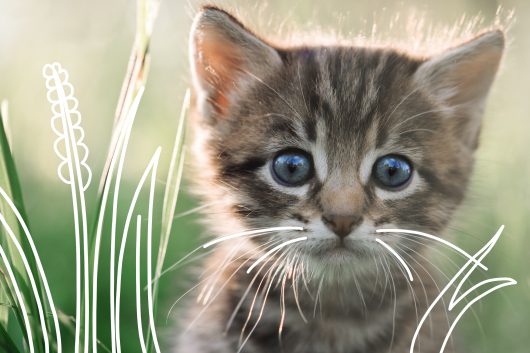Vaccinating kittens and cats
There’s no specific treatment for most of the viruses that affect our pets today and we believe that ‘prevention is better than cure’, so vaccinating kittens and cats is the recommended course of action. Cat flu is still a very common disease, and sadly we also often see cats that have been infected with Feline Leukaemia Virus, a frequently fatal disease. Both of these and many other diseases can be prevented or kept to a minimum just by a simple vaccination.
We recommend yearly booster vaccinations to ensure that your cat’s immune system is always prepared in its constant fight against disease. When taking out cat insurance, it’s important to make sure that your cat’s vaccinations are up to date, otherwise you may not be able to claim should an illness occur that could’ve been prevented through vaccination.
Some of the diseases vaccinated against (see below) are treatable but some can be fatal which is why we recommend keeping up to date with your boosters to help protect your cat.

Vaccinating kittens
We recommend that kittens are given their initial course of vaccinations from around nine weeks of age. This consists of one injection, followed by a second three weeks later. These should then be followed by a booster vaccination on an annual basis. These vaccinations will help protect your cat against:
Feline Leukaemia Virus
- This virus is the most common infectious cause of death in cats of less than one year.
- Causes the development of leukaemia (cancer of the blood cells), anaemia, and can even cause cancer of the eyes, kidneys, chest, liver and intestinal system.
- Virus is found in cat’s saliva and spread by mutual grooming.
Cat Flu
- Symptoms include runny eyes, sneezing, ulcers on tongue, mouth and eyes.
- Can be fatal in kittens if left untreated.
Feline Enteritis
- Causes diarrhoea, severe vomiting and is usually fatal.
- Kittens are most at risk but it can affect adults too.
It’s never too late to start a vaccination programme
If you have an older cat, it’s not too late to start a vaccination programme (available through schemes such as The Healthy Pet Club) and your vet will be able to advise you on this. Older cats often have a weaker immune system so it’s especially important to give them a helping hand and keep their boosters up to date. Most reputable catteries will not take cats for boarding unless they have an up to date vaccination record.
If more than 12 months pass between boosters, your cat may need to restart their vaccination course as their immunity will have deteriorated.
Health check
At the time of vaccination, your vet will also give your cat a thorough clinical examination that can alert you to problems ranging from bad teeth to heart disease. This examination is vital for the well-being of your cat and is a valuable opportunity for you to discuss any concerns or queries you may have about your cat’s health.
And just in case…
It’s always worthwhile having a cat insurance policy in place. Kittens can also benefit from four weeks’ free WalkawayCover through your local CVS veterinary practice.
(Kitten must be between eight weeks to one year of age and is subject to a CVS health check. WalkawayCover covers illness and accidents instantly).
You might also be interested in…
Get a quote in minutes…

Existing customers
Call now on 0808 164 7999
to discuss your policy with us.
Monday - Friday: 08:00 - 20:00 Saturday: 09:00 - 14:00






 Back
Back
